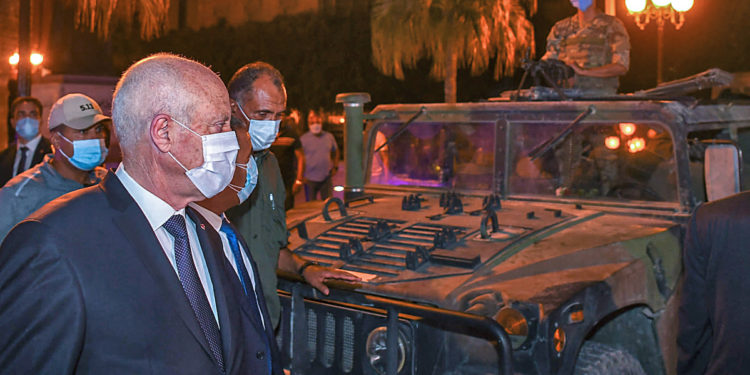Civil society groups warned against any “illegitimate” extension of Saied’s 30-day suspension of parliament, and demanded in a joint statement a timeline for political action.
After suspending parliament and sacking Hichem Mechichi as prime minister on Sunday, and firing the defense and justice ministers on Monday, Saied then ordered the dismissal of several top officials.
Late on Tuesday, 63-year-old Saied, a former law lecturer who was a political newcomer when he won a landslide 2019 presidential election victory, issued decrees sacking a long list of senior government officials, including the army’s chief prosecutor.
On Wednesday, he also dismissed the chief executive of national television channel Wataniya.
In addition, he has lifted the parliamentary immunity of lawmakers and assumed judicial powers.
Saied said his actions are justified under the Constitution, which allows the head of state to take unspecified exceptional measures in the event of an “imminent threat”.
On top of the political turmoil, the North African nation is beset by a crippling economic crisis including soaring inflation and high unemployment, as well as surging COVID-19 infections.
The moderate Islamist Ennahdha party, which was the largest faction in the coalition government, has labeled the power grab a coup d’etat, while the United States, the European Union and other Western powers have voiced strong concerns.
French Foreign Minister Jean-Yves Le Drian on Wednesday urged Tunisia to rapidly appoint a new prime minister and government.
Judicial probe
Saied has instructed Foreign Minister Othman Jerandi to contact European officials over the latest developments in Tunisia, the Tunisian Foreign Ministry said in a statement on Wednesday.
Jerandi, during his talks with Le Drian, State Secretary of the German Federal Foreign Office Miguel Berger and the EU High Representative for Foreign Affairs and Security Policy Josep Borrell, informed them of the latest developments in Tunisia since Saied’s decisions announced on Sunday.
Jerandi said Saied’s decisions were based on constitutional provisions aimed at preserving Tunisia’s stability and the proper functioning of the state institutions, protecting and ensuring their sustainability amid the unprecedented challenges.
The three European officials expressed their readiness to support Tunisia in its democratic move to ensure the establishment of the rule of law, democracy and human rights.
Further ramping up tensions, the Tunisian prosecutor’s office announced on Wednesday that the judiciary had opened an investigation into allegations that Ennahdha and two other political parties received illegal funding ahead of the elections in 2019.
The financial arm of the judiciary opened the probe on July 14, focusing on “the foreign financing and acceptance of funds of unknown origin”, prosecution spokesman Mohsen Dali said.
Saied, who has said he is determined to revolutionize the political system through changes to the law, said he would assume executive power with the help of a government whose new chief he would appoint himself.
Many in the nation of 12 million people say they have seen little improvement in living standards in recent years.
The ousted government had also been criticized for its handling of the COVID-19 pandemic. Tunisia has one of the world’s highest official death tolls from the disease in per capita terms.









